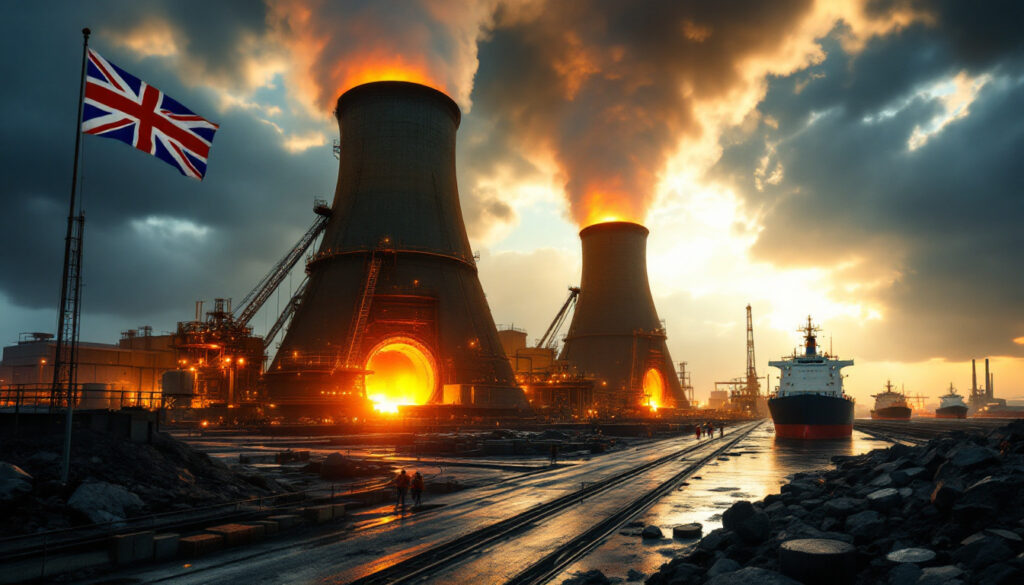Understanding the UK Government's Steel Gambit
The UK government made a bold move in April 2025 by intervening to prevent the closure of British Steel's two blast furnaces in Scunthorpe, northern England. This decisive action represents what many industry analysts are calling a "steel gambit" – a strategic but risky play that places the UK directly in the crossfire of escalating global trade tensions. As the UK's last producer of virgin steel faced extinction, the government's intervention signals a fundamental shift in industrial policy, prioritizing domestic manufacturing capabilities over free-market principles.
The intervention comes at a critical juncture in global trade relations. With former President Trump back in the White House and implementing aggressive protectionist policies, the UK finds itself navigating treacherous waters between competing trade blocs. Bloomberg analyst Joe Mayes noted that "the government's gambit could either secure Britain's industrial future or trigger devastating trade retaliation from major partners."
Beyond immediate economic considerations, the move reflects growing concerns about national security and supply chain resilience. Virgin steel production – the process of creating new steel from iron ore rather than recycling – remains essential for numerous high-grade applications in defense, aerospace, and critical infrastructure. The preservation of this capability has become a strategic imperative for the UK government amid increasing global instability and ongoing efforts toward decarbonising steel industry.
What Led to the UK Government's Intervention in British Steel?
The Imminent Threat of Closure
British Steel's Scunthorpe operations had been teetering on the brink of collapse for months before the government's emergency intervention in April 2025. The two blast furnaces, which represent the UK's entire virgin steel-making capacity, faced permanent shutdown due to a perfect storm of challenges: soaring energy costs, cheaper imports from Asia, and increasing carbon compliance expenses.
Industry insiders revealed that once these blast furnaces cool completely, restarting them becomes prohibitively expensive – effectively making any closure permanent. "The economics of reactivation simply don't add up," explained a senior metallurgist at the Scunthorpe facility. "We're talking about hundreds of millions of pounds to restart cold furnaces, assuming you could even find the specialized workforce still available."
For the community of Scunthorpe, where generations of families have worked in steel production, the closure would have devastated the local economy. With approximately 3,000 direct jobs and an estimated 12,000 positions in the supply chain at stake, the social cost of inaction proved too high for government officials to ignore.
Emergency Powers and Financial Support
In an unprecedented move, the UK government invoked rarely-used emergency economic powers to direct staff operations at British Steel and allocate public funds for essential raw materials. The exact financial commitment remains undisclosed, but industry sources estimate initial support reaches into hundreds of millions of pounds, covering immediate operational needs including iron ore and coking coal supply.
The legal mechanism employed – the Economic Resilience and Critical Industries Act of 2024 – grants ministers temporary control over strategically important companies facing imminent collapse. This legislation, hastily passed following Brexit supply chain disruptions, had never before been activated for an industrial intervention of this scale.
Financial analysts note that the government's current intervention appears to be laying groundwork for full nationalization. "The emergency powers were designed as a stopgap measure," observed a senior economist at Capital Economics. "The pattern we're seeing – securing supply chains, stabilizing operations, securing intellectual property – mirrors classical pre-nationalization playbooks seen in previous industrial rescues."
How Does the Steel Crisis Fit Into Global Trade Tensions?
Timing Within Global Trade Conflicts
The UK government's steel gambit and trade war coincides with an alarming escalation in global trade hostilities. By April 10, 2025, companies worldwide had begun pausing orders amid uncertainty created by a new wave of tariffs and counter-tariffs between major economies. The Biden administration's carbon border adjustment mechanism has now been superseded by Trump's more aggressive "America First 2.0" trade agenda, creating unprecedented volatility in global markets.
The UK steel intervention places Britain in a precarious position between competing trade blocs. The European Union has criticized the move as potential state aid violation under the EU-UK Trade and Cooperation Agreement, while Trump's administration has signaled potential punitive measures against what it terms "unfair trading practices." Chinese officials have warned the UK government to treat the owners of British Steel fairly while continuing to subsidize their own domestic steel producers.
Trade experts highlight that the timing couldn't be more complicated. "The UK is trying to navigate a trade minefield," explains a former WTO negotiator. "Intervening in steel production while global trade architecture is fracturing creates significant diplomatic challenges."
Strategic Industrial Policy Considerations
Beyond immediate economic concerns, the government's intervention reflects a fundamental reassessment of strategic industrial policy. Following decades of free-market orthodoxy that saw manufacturing capacity shift overseas, the UK joins a growing list of nations prioritizing domestic production capabilities for critical materials and components.
This policy shift aligns with the broader "economic sovereignty" doctrine gaining traction globally. As supply chain vulnerabilities exposed during the pandemic and subsequent geopolitical tensions have prompted a reevaluation of critical industrial capacities. The UK government's 2024 National Economic Resilience Framework explicitly identified steel production as a strategic necessity for both economic security and defense capabilities.
What distinguishes the UK approach is its targeted nature – focusing specifically on virgin steel production rather than the entire metals sector. This precision intervention reflects a sophisticated understanding that while recycled steel meets many industrial needs, virgin steel quality remains essential for certain high-performance applications, including naval vessels, nuclear facilities, and aerospace components.
What Are the Potential Consequences of the Government's Steel Strategy?
Trade Retaliation Risks
The UK's intervention creates significant exposure to retaliatory trade measures from major partners. Trade experts warn that targeted tariffs against UK exports represent the most immediate threat, particularly from the United States where the steel industry maintains significant political influence. Historical precedent suggests such measures could target strategic UK exports like Scotch whisky, aerospace components, and pharmaceutical products.
Beyond direct tariffs, the UK faces potential exclusion from preferential trade arrangements or quotas. The EU's carbon border adjustment mechanism already poses challenges for British exports, and exemptions negotiated in the TCA could be reconsidered in light of what Brussels might classify as improper state aid. Similarly, ongoing UK-US trade negotiations now face additional complications from tariff fears impact.
Perhaps most concerning is the risk of becoming collateral damage in broader trade conflicts. "The UK now sits precariously between competing trade blocs," notes a senior fellow at Chatham House. "When elephants fight, the grass gets trampled – and Britain's intervention in steel places it directly in the conflict zone between US, EU and Chinese trade priorities."
Economic and Fiscal Implications
The direct costs of supporting British Steel operations represent only the tip of the financial iceberg. Government figures from similar interventions suggest ongoing operational subsidies could range from £50-100 million annually, depending on global steel prices and energy costs. The potential nationalization brings long-term liabilities including pension obligations estimated at £2.1 billion according to industry analysts.
Beyond direct expenditure, wider economic impacts merit consideration. Preserving relatively high-cost domestic steel production will increase input costs for UK manufacturers in sectors like automotive, construction, and machinery production. These downstream industries employ significantly more workers than steel production itself, creating potential economic trade-offs.
Fiscal hawks within the Treasury have expressed concerns about precedent-setting effects. "Once you start rescuing strategic industries, where do you draw the line?" questioned a former budget official. "The risk of contagion – other struggling sectors demanding similar treatment – creates fiscal uncertainty that markets tend to punish."
How Might Global Trade Wars Impact the UK Steel Industry?
Tariff and Non-Tariff Barriers
Even with government support, British Steel faces significant external challenges from evolving trade restrictions. Current US tariffs on imported steel (25% since Trump's first term) already create competitive disadvantages for UK producers in North American markets. The likelihood of these barriers increasing under renewed protectionist policies appears high, with American steel industry groups lobbying for rates up to 50% on foreign producers receiving government support.
Less visible but equally impactful are the proliferating non-tariff barriers. Technical standards, certification requirements, and inspection regimes increasingly fragment global markets. The UK steel industry must navigate divergent regulatory frameworks in EU, US, and Asian markets, creating compliance costs estimated at 3-5% of revenue according to industry association data.
Perhaps most concerning is the trend toward quota restrictions rather than simple tariffs. These volume-based limitations can effectively lock UK producers out of key markets regardless of price competitiveness. Recent US proposals to cap steel imports at 63% of 2017-2019 average volumes would effectively eliminate British Steel's access to American customers, further complicating geopolitical market strategies.
Supply Chain Vulnerabilities
The global steel industry depends on complex international supply chains now threatened by trade conflicts. For British Steel specifically, raw material imports face increasing disruption. The company relies on Brazilian iron ore (approximately 63% Fe content) and American metallurgical coal, both potentially subject to export restrictions by countries prioritizing domestic manufacturers.
Downstream industries dependent on steel inputs face even greater complications. The UK automotive sector, already struggling with post-Brexit transition, now confronts potential steel shortages and price volatility. Similar concerns apply to construction, where steel rebar availability impacts project timelines and costs. Engineers report that material uncertainty has begun affecting design decisions, with some specifications modified to accommodate potential supply interruptions.
Logistical challenges compound these vulnerabilities. Shipping costs for steel products have increased 37% in the past six months according to industry data, with container availability increasingly constrained by trade route disruptions. For time-sensitive construction projects, these delays create cascading impacts throughout supply chains, affecting the entire commodity super cycle.
FAQ: UK Steel Industry and Trade Tensions
What is virgin steel and why is it strategically important?
Virgin steel refers to steel produced directly from iron ore in blast furnaces, as opposed to recycled steel made by melting scrap in electric arc furnaces. The distinction matters because virgin steel typically offers superior metallurgical properties, including higher purity, more precise alloying control, and fewer residual elements that can compromise performance in demanding applications.
Strategically, virgin steel production capability provides nations with independence from imported high-grade steel required for defense applications, critical infrastructure, and advanced manufacturing. Naval vessels, nuclear facilities, and aerospace components often specify virgin steel due to its superior fatigue resistance and predictable performance under extreme conditions.
The UK Ministry of Defence has identified domestic virgin steel production as essential for sovereign capability, citing specific military requirements that cannot be reliably sourced from recycled materials or foreign suppliers. This strategic consideration underpins much of the government's intervention rationale.
How does the UK steel industry compare globally?
The UK steel industry has experienced dramatic contraction over recent decades, with current production capacity of approximately 7 million tonnes annually – less than 0.4% of global output. This places Britain far behind global leaders like China (1 billion+ tonnes), India (120 million tonnes), and even European neighbors like Germany (40 million tonnes).
British steel production peaked in the 1970s at around 28 million tonnes before experiencing steady decline. Several factors contributed to this contraction, including higher energy costs relative to competitors, earlier environmental regulations, and strategic decisions to focus on financial services rather than manufacturing. Where the UK once employed over 320,000 steelworkers, today fewer than 30,000 remain in the industry.
Despite this diminished production footprint, the UK maintains technological advantages in certain high-value steel products, particularly advanced stainless steels and specialized alloys used in aerospace, medical devices, and energy infrastructure. These niche capabilities represent potential growth areas should the government's intervention succeed in stabilizing the sector, as detailed in recent global commodities insights.
What are the environmental implications of maintaining blast furnace operations?
Traditional blast furnace operations create significant environmental challenges. Each tonne of steel produced via this route generates approximately 1.8-2.0 tonnes of CO2 emissions, making steel production responsible for roughly 7-9% of global carbon emissions. British Steel's Scunthorpe operations account for approximately 2.8 million tonnes of carbon dioxide annually – among the UK's largest industrial emitters.
Modern alternatives offer substantially lower emissions profiles. Electric arc furnaces using recycled scrap produce roughly 0.4 tonnes of CO2 per tonne of steel when powered by renewable electricity. Even more promising, emerging hydrogen-based direct reduction processes can potentially reduce emissions by over 95% compared to traditional methods.
The government intervention creates an environmental policy tension. Preserving blast furnace operations conflicts with the UK's legally binding carbon reduction targets, including net-zero by 2050. To address this contradiction, the intervention package reportedly includes £300 million earmarked for decarbonization investments over five years, focusing on carbon capture technologies and hydrogen injection pilots. Environmental groups remain skeptical about these commitments, noting that fundamental blast furnace physics limits potential emission reductions without complete technological transformation.
Conclusion: Navigating the Future of UK Steel
Balancing Sovereignty and Trade Relations
The UK government's steel gambit and trade war represents a high-stakes gamble that places industrial sovereignty above orthodox free-trade principles. Successfully navigating this path requires delicate diplomatic maneuvering to minimize trade retaliation while maximizing domestic benefits. The challenge lies in framing the intervention not as protectionist but as addressing market failures in strategic industries – a distinction increasingly blurred in today's fragmented trade environment.
For British policymakers, the steel intervention offers valuable lessons in the limitations of post-Brexit trade flexibility. While theoretical sovereignty has increased, practical economic interdependence remains a constraining reality. Future interventions will likely require more sophisticated coordination with trading partners, potentially including multilateral approaches to addressing global steel overcapacity rather than unilateral actions.
The most promising path forward involves transformational investment rather than simple preservation. By coupling operational support with radical technological modernization – particularly hydrogen-based steelmaking and carbon capture – the UK could potentially leapfrog competitors rather than merely maintain legacy production systems. This approach would align industrial strategy with environmental commitments while creating defensible competitive advantages in emerging green steel markets.
As global trade architecture continues fragmenting into regional blocs, Britain's steel gambit may represent an early example of a broader economic paradigm shift – one where strategic industries receive targeted government support based on sovereignty considerations rather than purely market logic. Whether this represents a temporary response to extraordinary circumstances or a fundamental realignment of UK industrial policy remains the central question for investors, trading partners, and British citizens alike.
Ready to Stay Ahead of Major Mining Discoveries?
Discover investment opportunities before the market with Discovery Alert's real-time notifications of significant ASX mineral discoveries, powered by their proprietary Discovery IQ model. Visit the Discovery Alert discoveries page to see how historic mining discoveries have generated substantial returns for early investors.




